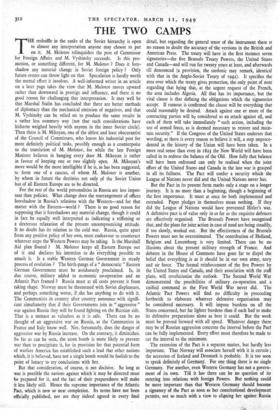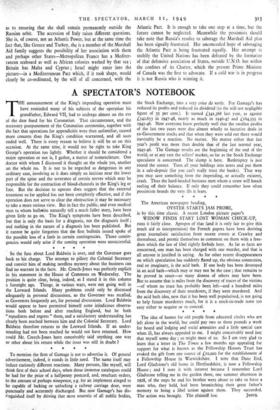THE TWO CAMPS
T. BE reshuffle in the ranks of the Soviet hierarchy is open to almost any interpretation anyone may choose to put on it. M. Molotov relinquishes the post of Commissar for Foreign Affairs and M. Vyshinsky succeeds. Is this pro- motion, or something different, for M. Molotov ? Does it fore- shadow any material change in Soviet foreign policy ? Only future events can throw light on that. Speculation is hardly worth the mental effort it involves. A well-informed writer in an article on a later page takes the view that M. Molotov moves upward rather than downward in prestige and influence, and there is no good reason for challenging that interpretation. It may well be that Marshal Stalin has concluded that there are better methods of diplomacy than the mechanical emission of negatives, and that M. Vyshinsky can be relied on to produce the same results in a rather less summary way (not that such considerations have hitherto weighed heavily with anyone in the inner Soviet circle). Then there is M. Mikoyan, one of the ablest and least obscurantist of the Council of Commissars, who leaves his industrial post for more definitely political tasks, possibly enough as a counterpoise to the translation of M. Molotov, for while the late Foreign Minister believes in banging every door M. Mikoyan is rather in favour of keeping one or two slightly open. M. Mikoyan's move would be the more intelligible if he is, as has been suggested, to form one of a caucus, of whom M. Molotov is another, by whom in future the destinies not only of the Soviet Union but of all Eastern Europe are to be directed.
For the rest of the world personalities in Russia are less impor- tant than policies. What change does the rearrangement of offices foreshadow in Russia's relations with the Western—and for that matter with the Eastern—world ? There is no good reason for supposing that it foreshadows any material change, though it could in fact be equally well interpreted as indicating a stiffening or a dexterous relaxation of the present uncompromising attitude. It no doubt has its relation to the cold war. Russia, quite apart from any positive policy of her own, must endeavour to counteract whatever steps the Western Powers may be taking. Is the Marshall Aid plan floated ? M. Molotov keeps all Eastern Europe out of it and declares his intention to do everything possible to smash it. Is a stable Western German Government in steady process of evolution ? The birth-pangs of a " democratic " Eastern German Government must be • assiduously proclaimed. Is, in due course, military added to economic co-operation and an Atlantic Pact framed ? Russia must at all costs prevent it from taking shape. Norway must be threatened with Soviet displeasure, and perhaps something worse, if; she has anything to do with it. The Communists in country after country announce with signifi- cant simultaneity that if their Governments join in " aggressive " war against Russia they will be found fighting on the Russian side. That is a menace as valueless as it is safe. There can be no thought of an aggressive war on Russia, as the Communists in France and Italy know well. Nor, fortunately, does the danger of aggressive war by Russia increase. On the contrary, it diminishes. So far as can be seen, the atom bomb is more likely to prevent war than to precipitate it, for in provision for that potential form of warfare America has established such a lead that other nations which, it is believed, have not a single bomb would be foolish to the point of lunacy to try conclusions with her.
• But that consideration, of course, is not decisive. So long as war is possible the nations against whichit may be directed must be.prepared for it, and the fact of their preparedness will make it less likely still. Hence the supreme importance of the Atlantic Pact, which is now so near completion. Its terms have not been officially. published, nor are they indeed agreed in every final detail, but regarding the general tenor of the instrument there is no reason to doubt the accuracy of-the versions in the British and American Press. The treaty will have in the first instance seven signatories—the five Brussels Treaty Powers, the United States and Canada—and will run for twenty years at least, and afterwards till denounced (a provision, the sardonic may remark, identical with that in the Anglo-Soviet Treaty of 1942). It specifies the area over which the treaty gives protection, the only point of note regarding that being that, at the urgent request of the French, the area includes Algeria. All that has its importance, but the vital clause is that defining the obligations which the signatories accept. If rumour is confirmed the clause will be everything that could reasonably be desired. Attack against one or more of the contracting parties will be considered as an attack against all, and each of them will take immediately " such action, including the use of armed force, as is deemed necessary to restore and main- tain security." If. the Congress of the United States endorses that wording; as there is every reason to believe it will, a step unprece- dented in the history of the Union will have been taken. In a more real, sense than even in 1823 the New World will have been called in to redress the balance of the Old. How fully that balance will have been redressed can only be realised when the joint effort of the United States and Canada in the late war is grasped in all its fullness. The Pact will confer a security which the League of Nations never did and the United Nations never has.
But the Pact in its present form marks only a stage on a longer journey. It is no more than a beginning,- though a beginning of the first importance. It must at once be both implemented and extended. Paper pledges in themselves mean nothing. If they did the League of Nations would have prevented Hitler's war. A defensive pact is of value only in so far as the reqUisite defences are effectively organised. The Brussels Powers have recognised that, and the plans for joint action in case of need are being steadily, if too slowly, worked out. . But the effectiveness of the Brussels Powers must not be overestimated. The contribution of Holland, Belgium and Luxemburg is very limited. There can be no illusions about the present military strength of France. And debates in the House of Commons have gone far to dispel the belief that everything is as it should be in our own army, navy and air force. The formal reinforcement of the five Powers by the United States and Canada, and their association with the staff plans, will, revotationise the outlook. The Second World War demonstrated the possibilities of military _co-operation and a unified command as. the First World War never did. The Atlantic Pact Powers will find no difficulty in -proceeding forthwith to elaborate whatever defensive organisation may be considered necessary. It will- impose burdens on all the States concerned, but far lighter burdens than if each had to make its defensive preparations alone as best it could. But the work must be pressed forward with all speed. Whatever danger there may be of Russian aggression concerns the interval before the Pad can be fully implemented. Every effort must therefore be made to cut the interval to the minimum.
The extension of the Pact is a separate matter, but hardly less important. That Norway will associate herself with it is certain ; the accession of Iceland and Denmark is probable. It is too soon to speak definitely of Gerrhany. For one thing there is no single Germany. For another, even Western Germany has not a govern- ment of its own. Till it has there can be no question of its entering into relations with foreign Powers. But nothing could be more important than that Western Germany should become a signatory of the Pact as soon as her constitutional development permits, not so much with a view to aligning her against Russia as to ensuring that she shall remain permanently outside the Russian orbit. The accession of Italy raises different questions. She is, of course, not an Atlantic Power, but at the same time the fact that, like Greece and Turkey, she is a member of the Marshall Aid family suggests the possibility of her association with them and perhaps other States—Metropolitan France has a Mediter- ranean seaboard as well as African colonies washed by that sea ; Britain has Malta and Cyprus ; Israel might enter into the picture—in a Mediterranean Pact which, if it took shape, would clearly be co-ordinated, by the will of all concerned, with the Atlantic Pact. It is enough to take one step at a time, but the future cannot be neglected. Meanwhile the pessimists should take note that Russia's resolve to sabotage the Marshall Aid plan has been signally frustrated. Her unconcealed hope of sabotaging the Atlantic Pact is being frustrated equally. Her attempt to stultify the United Nations has been defeated by the formation of that defensive association of States, outside U.N.O. but within the confines of its Charter, which the present Prime Minister of Canada was the first to advocate. If a cold war is in progress it is not Russia who is winning it.







































 Previous page
Previous page